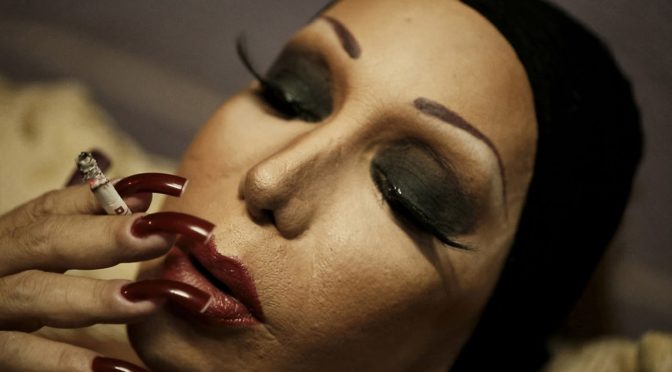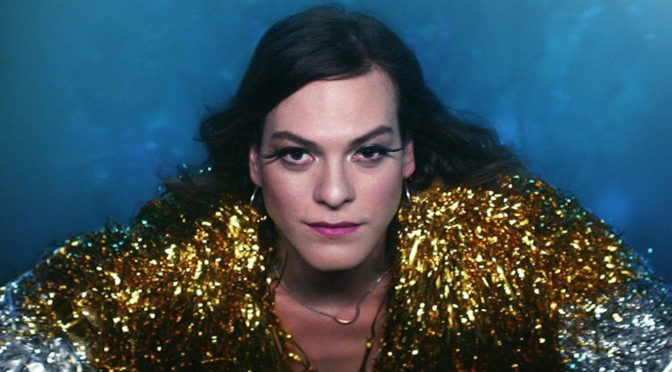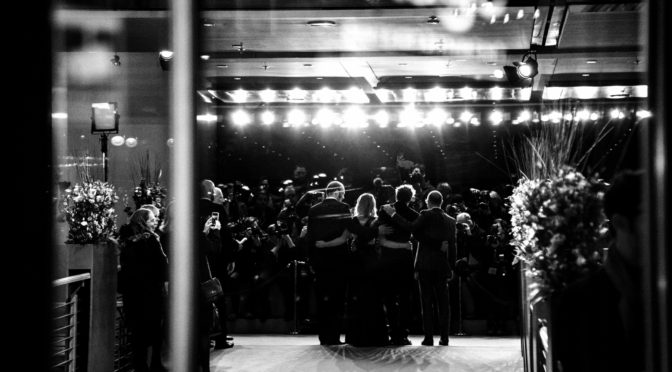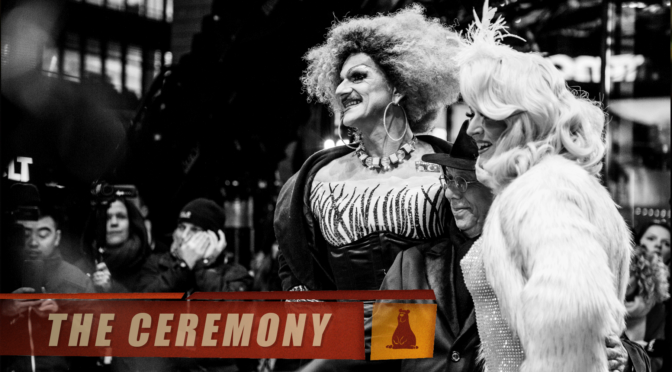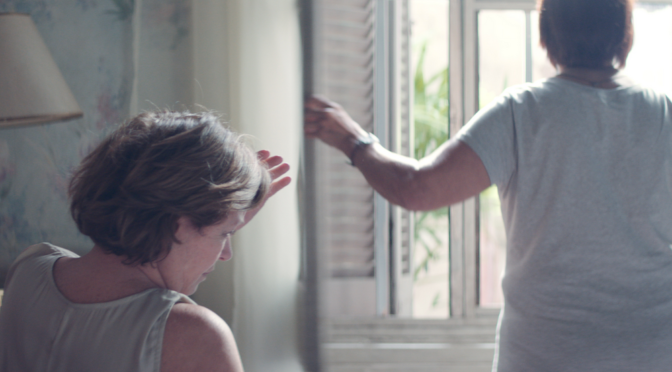Evangelina Kranioti’s ethereal documentary ‘Obscuro Barroco’, following the experiences of transgender personality Luana Muniz as she navigates the streets of Rio de Janeiro’s Carnival, promises “a story of a calm darkness”. But across the film we follow a movement from night to day, with the closing scenes of the film depicting beams of sunlight stretching across the skyline. The transformation of the city from darkness to light offers a symbolic parallel to the metamorphosis of gender seen in the film, and more generally to the growing visibility of the trans population in this region. Just as the trans protagonist steps into Rio’s dawn, numerous trans artists are emerging onto the Brazilian art scene. Kranioti’s documentary is the first of a number of Brazilian and Latin American films submitted to the Teddy Award 2018, celebrating trans and queer culture. ‘Bixa Travesty’, directed by Kiko Goifman, is a tender biopic of Brazilian transgender singer Linn da Quebrada, and ‘La omisión’, Argentinian filmmaker Sebastián Schjaer’s first full-length fiction film, portrays the struggles of a young transient worker. The increasing representation of trans people on the big screen is matched by developments on the small screen. 2017 saw the production of TV Series, ‘Edge of Desire’, a soap opera chronicling the transition of a transgender man that draws in roughly 50 million viewers per night[1]. Broadcast on Brazilian TV network, Globo, the show is the nation’s first ever soap opera featuring a transgender character. Similarly, transgender singer Pabllo Vittar broke the Brazilian record for YouTube view with their song Sua Cara this year[2], and British transgender playwright Jo Clifford’s show, ‘The Gospel According to Jesus, Queen of Heaven’, which imagines Jesus as a trans woman, continues to be a sell-out hit at theatres across the country since its arrival in 2016[3]. Brazil is home to a large community of transgender people, added to which are the members of what is known as the country’s “third sex”, travestis (individuals designated male at birth, but who live a feminine gender identity). Its annual Pride parade in Sao Paolo, which attracted an estimated 3 million attendants this year[4], is the largest in the world. The country is also seen as something of a beacon when it comes to the legal rights of LGBT people. The government was one of the first to work with LGBT rights organisations to offer free medical care to HIV/AIDS sufferers, and 2013 saw the legal recognition both of same-sex marriage and of the right to change a person’s name and gender marker on some government-issued identification documents[5]. It is only right, then, that the growing legal realisation of trans identities is mirrored in the realisation of those identities in Brazilian art. But there is a looming shadow over these advancements; with more visibility in the public sphere comes louder and more violent hostility. In the art world that hostility translates to societal censorship, with two Brazilian exhibitions of queer art this year being shut down early thanks to right-wing and conservative Christian protests. In everyday terms the opposition to the trans and queer community takes the form of brutal violence. “Machismo” culture is still very prominent in parts of Latin America: according to the UN, a woman is assaulted every 15 seconds in Sao Paolo[6], and in 2017, 200 LGBT individuals were murdered in Brazil. Trans people are particularly at risk, as was cruelly illustrated earlier this year when a video went viral of trans woman, Dandara dos Santos, being tortured and killed in Fortaleza. It may be many years before trans art can step into a light unpolluted by such prejudice and violence, but for the moment we must recognise the courage of the many film-makers, actors, singers, and theatre-goers that are publically celebrating queer and transgender culture despite such animosity. By Hannah Congdon [1] https://www.nytimes.com/2017/10/07/world/americas/brazil-transgender-pabllo-vittar.html [2] https://www.nytimes.com/2017/10/07/world/americas/brazil-transgender-pabllo-vittar.html [3] https://www.youtube.com/watch?v=hWNQtlsvQiY [4] http://www.rioonwatch.org/?p=37249 [5] http://www.rioonwatch.org/?p=37249 [6] http://www.bbc.com/news/world-latin-america-33939470
Category Archives: Blog
A Very Fantastic Woman Gets an Oscar
During the celebration of the 90th Academy Award last Sunday, ‘Una Mujer Fantástica’ (‘A Fantastic Woman’), was awarded the Oscar for Best Foreign Language Film. The film, which won the 31st TEDDY AWARD for best feature in 2017, is the work of Chilean director Sebastián Lelio. The Academy Award for a non-English speaking film has been given away since 1956 and ‘A Fantastic Woman’ is a landmark recipient in a number of respects; it’s the first first Chilean film to win the foreign-language Oscar, the first film with a trans themed plot to take home the prize, and lead actor Daniela Vega is the first openly transgender person to present an award on stage at the ceremony. Sebastián Lelio praised Daniela Vega as “the inspiration for this movie”. 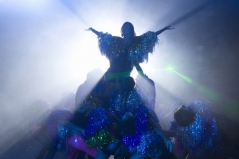 The story follows Marina (Daniela Vega), a transgender woman working as a waitress, who has a loving relationship with Orlando (Francisco Reyes), a divorced man 30 years her senior. Their affectionate love is brought to an abrupt end on the day of Orlando’s sudden death. In the aftermath of this tragedy, Marina is faced with the hatred of Orlando’s ex-wife and children. She fights simultaneously for her right to mourn her beloved one and against the prejudices and harassment from her late lover’s family. The film not only gives a sensitive portrayal of the universal right to grieve but also tells the intimate story of a trans women in today’s conservative Chile. On a broader level, the film highlights the transphobia and ignorance constituting every-day life for many transgender people around the world. Few would be able to leave the cinema unmoved by this touching story of love and loss. To learn more about the film, have a look at our interview with director Sebastián Lelio and lead actors Daniela Vega and FranciscoReyes: https://www.youtube.com/watch?v=Q9VQLBKaP9Q
The story follows Marina (Daniela Vega), a transgender woman working as a waitress, who has a loving relationship with Orlando (Francisco Reyes), a divorced man 30 years her senior. Their affectionate love is brought to an abrupt end on the day of Orlando’s sudden death. In the aftermath of this tragedy, Marina is faced with the hatred of Orlando’s ex-wife and children. She fights simultaneously for her right to mourn her beloved one and against the prejudices and harassment from her late lover’s family. The film not only gives a sensitive portrayal of the universal right to grieve but also tells the intimate story of a trans women in today’s conservative Chile. On a broader level, the film highlights the transphobia and ignorance constituting every-day life for many transgender people around the world. Few would be able to leave the cinema unmoved by this touching story of love and loss. To learn more about the film, have a look at our interview with director Sebastián Lelio and lead actors Daniela Vega and FranciscoReyes: https://www.youtube.com/watch?v=Q9VQLBKaP9Q
The TEDDY Winners 2018
And the winner is…
Best Feature Film
Tinta Bruta
By Marco Reolon, Filipe Matzembacher
Best Documentary Film
Bixa Travesty (Tranny Fag)
By Claudia Priscilla, Kiko Goifam
Best Short Film
Three Centimetres
By Lara Zeidan
DIE TEDDY Jury Award
Obscuro Barocco
By Evangelia Kranioti
L`Oreal TEDDY Newcomer Award
Retablo
By Alvaro Delgado Aparicio
TEDDY Readers` AWARD powered by Mannschaft Magazin
Las Herederas (The Heiresses)
By Marcelo Martinessi
TEDDY AWARD CEREMONY 2018
For those unlucky few who weren’t able to join us for the famously fabulous TEDDY AWARD ceremony, you can see the entire ceremony here! Highlights include Wieland Speck’s annual speech, Sate Minister Markus’ Prabst defiant proclamation against homophobia, Jack Woodhead’s upside-down piano-playing, and Linn de Quebrada’s stunning stage performance.
All here for you to watch again and again…
TEDDY TODAY: Sunday 25th February
It breaks our hearts to say goodbye, but say goodbye we must as we reach the final day of the 68th Berlinale. Thank you for celebrating queer cinema with us, in all its wonderful shapes and sizes. A huge congratulations to all our award winners – both ‘Tinta Bruta’ and ‘Las Herederas’ screen today so catch them if you can!
Until next year, teddy-lovers!
Contra-Internet: Jubilee 2033
Director: Zach Blas,
USA/Great Britain 2018 29′, English, Spanish
Kino International, 16:00
The Happy Prince
Director: Rupert Everett
Germany/Belgium/Italy 2017 105′, English, French, Italian
Friedrichstadt-Palast, 09:30
Las herederas (The Heiresses)
Director: Marcelo Martinessi
Paraguay/Uruguay/Germany/Brazil/Norway/ France 2018, 95′, Spanish
Haus der Berliner Festspiele, 19:00
Mes provinciales (A Paris Education)
Director: Jean Paul Civeyrac
France 2018 136′, French
CineStar 3, 20:15
River’s Edge
Director: Isao Yukisada
Japan 2018 118′, Japanese
Cubix 9, 14:30
Three Centimetres
Director: Lara Zeidan
Great Britain 2017 9′, Arabic
International, 16:00
Tinta Bruta (Hard Paint)
Director: Marcio Reolon, Filipe Matzembacher
Brazil 2018
118′, Portuguese
CineStar 3, 17:45
Yours in Sisterhood
Director: Irene Lusztig
USA 2018 101′, English
Zoo Palast 2, 13:00
